Let’s Debate That

James Fishback aims to restore the art of the healthy argument
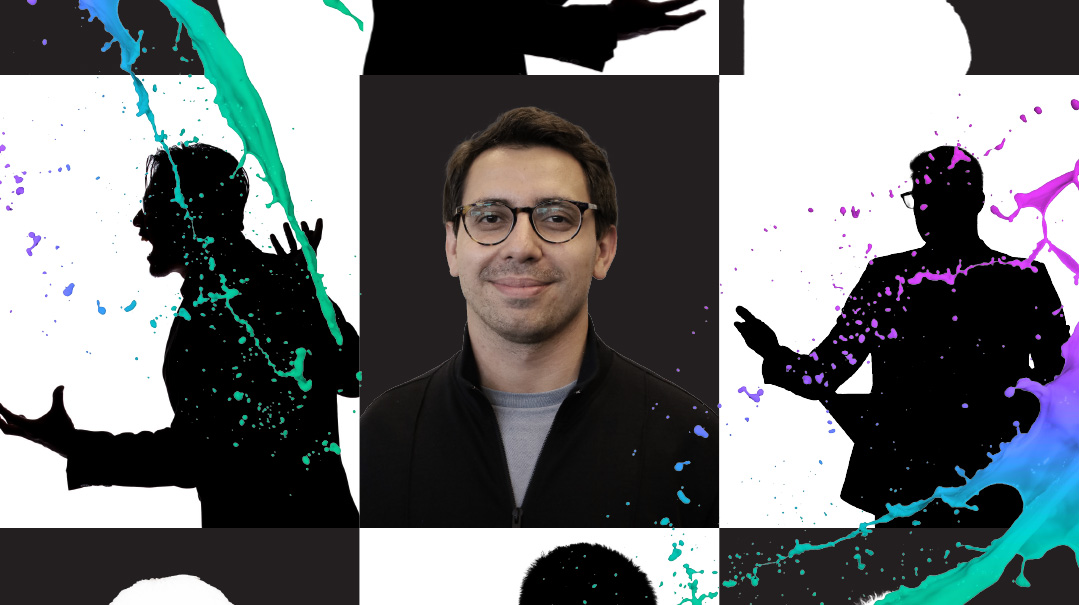
Photos: Alex Munguia
James Fishback, a former star high school debater and debate coach, dropped a bombshell at Bari Weiss’s The Free Press site on May 25. In a piece entitled “At High School Debates, Debate Is No Longer Allowed,” Fishback described how woke ideology is taking over competitive debate, as it has so many other venerable American institutions — colleges and universities, a large swath of corporate America, and women’s competitive sports.
As someone who views debate as my most formative high school educational experience (see Outlook, “Go Forth and Argue”), I was appalled and immediately reached out to James. Over nearly two hours of conversation, I discovered that he is not only a highly effective gadfly skewering the National Speech and Debate Association (NSDA), which has run high school debate for nearly a century, but a true entrepreneur in the realm of ideas.
At the age of 24, he re-imagined high school debate from the beginning, and created new debate formats that would inculcate competitors with traditional debating skills while avoiding new pitfalls. The new debate league that he built, Incubate Debate, began holding tournaments in Florida in 2020 and has already grown to be the biggest debate league in the Sunshine State. And perhaps most importantly, he’s demonstrated how a new generation can defend its principles with civility and professionalism while avoiding the intellectual snobbery and “canceling” that’s dominating too much of America’s public discourse.
Incubator of Political Power
High school debate, in my day, was the quintessential nerd activity: No one debated who could have made the basketball team. But those nerds — less than one percent of American high school students participate in debate — are disproportionately found later in life in positions of power, such as Supreme Court justices or United States senators.
Today, however, the debate space has changed. As Fishback puts it, America’s future leaders are marinated in an environment in which students fear to “present arguments in favor of capitalism, defending Israel, or challenging affirmative action.” The long range repercussions are frightening to contemplate.
In my day, admittedly a long time ago (though I can still remember every round I lost my senior year and why the judge was a dunce), our debating team would set off early in the morning for tournaments, approximately 15 weekends a year, accompanied by our double file cabinets of index cards weighing up to 20 pounds apiece, which we lugged from one round to another, four rounds in all. We debated a single topic all year — e.g., compulsory arbitration, a cut-off in military aid, universal national service — though at some tournaments, teams had to debate both sides of the topic.
Each of the four debaters, two per team, was allocated 15 minutes of speaking time — ten minutes for the opening speeches and five minutes for rebuttals. (At a few tournaments, the speaking time was cut slightly, and three minutes allocated for cross-examination.) Time limits were strictly enforced.
The implicit assumption of debate in those days was that the truth is likeliest to emerge from the clash of arguments — i.e., John Stuart Mill’s free marketplace of ideas. That attitude is the antithesis of the present-day zeitgeist, which maintains that truth belongs only to a class of anointed ones, and all who fail to recognize their superior wisdom are either bigots or hopeless fools.
No longer does competitive debate stand apart from the zeitgeist, as Fishback documents.
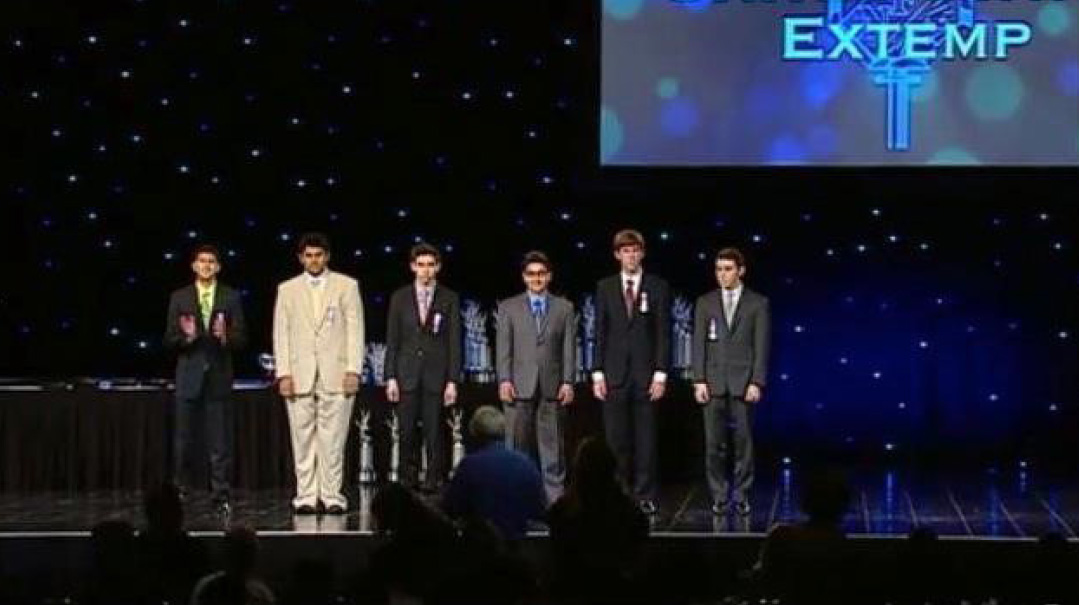
From champion to coach to reimagining the entire debate format. James as a high school debater on stage (second from left)
Better Unsafe than Sorry
Fishback first took notice that something was changing in high school debate while coaching the all-black debate team of Miami Norland Senior High School, after dropping out of Georgetown University to start his own hedge fund.
“During my time as a coach, I saw many students lose interest and quit,” he writes. “They had enough of being told what they could and could not say. A black student I coached was told by the debate judge that he would have won the round if he had not criticized Black Lives Matter.” (The judge apparently felt that it was inappropriate for a black student to criticize a black organization.)
Briana Whatley, a highly articulate young black woman, endured similar experiences. She grew so disillusioned with the NSDA that she dropped out to join Fishback’s Incubate Debate.
Whatley expressed her amazement to a Fox News interviewer at one NSDA topic, “How has affirmative action helped black people?” which explicitly assumed that affirmative action has been totally salutary for blacks. On another occasion, she was told prior to a debate on President Biden’s foreign policy not to praise his predecessor for the signing of the Abraham Accords.
“At NSDA tournaments, I am not guaranteed a win based on my reasoning, facts, or delivery,” Whatley said, “but rather on whether I reinforce my judge’s ideology throughout the debate.”
Fishback drew most of his evidence for the ideological takeover of high school debate from Tabroom, the public database maintained by the NSDA, at which judges post their “paradigms” for judging, which debaters have an opportunity to consult prior to rounds. Traditionally, judges would post instructions such as “focus on clarity over speed,” or “I like clash, quality evidence from qualified sources, comparative analysis. You have to explain your arguments, why your evidence is compelling, and how the arguments weigh in the round.”
But of late, those posts increasingly spell out the judges’ ideological presuppositions and how those will affect their judging. The example that drew the most attention was that of Lila Lavender, a 2019 collegiate debate champion: “Before anything else, including being a debate judge, I am a Marxist-Leninist Maoist…. I cannot check the revolutionary proletarian science at the door when I’m judging.”
Lavender then details at length the implications of that ideology: “[I will] never vote for rightist-capitalist-imperialist positions/arguments… Examples of arguments of this nature are as follows: fascism good, capitalism good, imperialist war good, neoliberalism good, defenses of US or otherwise bourgeois nationalism, Zionism, normalizing Israel, colonialism good, US white fascist policing, good, etc.”
Another judge, Shubham Gupta, warns debaters in his paradigm that if they use the term “illegal” when discussing those non-nationals who cross into America without a proper entry permit, i.e., those illegally in the country, “I will immediately stop the round, give you the loss with low speaks [i.e., speaker points], give you a stern lecture, and then talk to your coach…. I will not have you making the debate space unsafe.”
Other judges made clear that the identitarian obsessions of the diversity, equity, and inclusion regime have now entered debate, and that different rules apply, depending on the debaters’ skin color. Judge Lindsey Shrodek, who bears a “cultural competency” badge from the NSDA for completing a brief online module on how to consider identity and cultural background in evaluating debaters, prioritizes the “safety” of marginalized communities in the debate space – so much so that she instructs those appearing before her, “[I]f you are white, don’t run arguments which primarily affect POC [people of color]. These arguments should belong to the people affected.”
Fishback argues that Gupta and Shrodek’s concerns with “safety” in debate — i.e., the protection from ideas with which one might disagree — have actually resulted in debaters feeling less safe and more vulnerable to shaming and ridicule for expressing “wrong ideas” in the eyes of the judges.
“‘Unsafe’ conversations should be encouraged, even celebrated,” he says. “The debate I knew taught me to think and learn and care about issues that affected people different from me.”
Another example of some judges’ color consciousness: In some contemporary debate formats, debaters typically disclose to the other side prior to a round their primary evidence so that each side can better analyze the evidence presented by the other side. But one judge, X. Braithwaite, enunciated her own policy for black debaters: Blacks need not disclose their evidence to whites; whites must disclose to blacks.
That issue of different rules for different folks is particularly sensitive to Fishback. He was one of only two white students in his otherwise all-black high school class, and his debate partners were typically black. And he coached an all-black high school team for two years. None of those black debaters whom he partnered or coached wanted an asterisk beside their victories that would leave them and their opponents wondering whether their successes were a function of their skills or of the scales being tilted in their favor.
Fishback does not claim that Lila Lavender or any of the other judges quoted above typify all NSDA judges. Rather, his concern is that debaters “exposed to enough of these partisan paradigms internalize their point of view and adjust their arguments going forward.”
Steve Dubois, a Kansas schoolteacher with 27 years coaching debate, confirmed that supposition. He told Fishback that the majority of high school debates now occur “within fairly narrow ideological parameters — somewhere between moderate left and far left.”
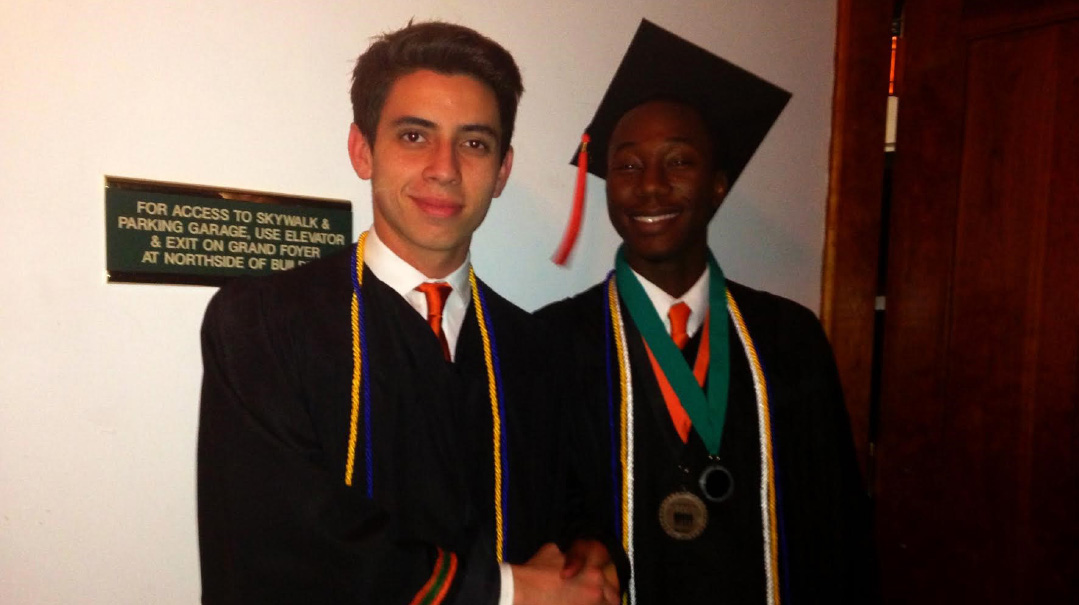
At the NFL debate nationals, and at his high school graduation
Squelching Debate
The NSDA did not respond to three emails and three phone calls from Fishback while he was preparing his Free Press article. But after the article appeared and went viral, the NSDA posted a statement that its “best practices” state, “Judges should decide the round as debated, not based on their personal beliefs.”
But far more relevant, James tells me, is that “the NSDA did not announce that it would remove or even reprimand the ideological judges who punish students for what they say.” Just the opposite. At the most recent national tournament, several of those judges were chosen to officiate.
John Hollihan, for instance, a debate coach at Pittsburgh Central Catholic High School, judged three rounds at the most recent nationals. His paradigm reads, “I am EXTREMELY skeptical of capitalism-good arguments. If you go for them, you better do a lot of analysis to convince me.”
Chaz Wyche was one of the judges for the final round. He “reserves the right to end the debate for anti-blackness.” And what is anti-blackness? According to Wyche’s MA thesis, any form of policing might be an example of anti-blackness: “anti-blackness created the concept of policing” and “police are a direct extension.” “All Lives Matter” also fell afoul of his strictures.
Another judge at NSDA Nationals, Rich Kawolics, warned participants, “An argument or behavior that is racist… xenophobic, ableist, or diminishes any person’s humanity because of their identity will earn you a loss.”
Such ideological prescriptions are encouraged by the NSDA itself. At the 2019 national tournament, for instance, the tournament parliamentarian told the participants to refrain from using gendered language, such as Mr. or Miss, in accord with the spirit of “equity and inclusion” the NSDA promotes.
Opposition Research
In a second Free Press piece, “Part II: At High School Debates, Watch What You Say” (June 26), supplementing his original piece, Fishback revealed that high school debate is now beset by some of the worst features of social media culture. Aggressive language and ad hominem attacks would once have earned a debater a sure loss. But today, arguments about the personal characteristics of one’s opponent having nothing to do with the debate topic may be the path to victory.
Matthew Adelstein, now a college sophomore and a self-described progressive, relates his experience at the high school Tournament of Champions in 2022. (Adelstein was one of the participants in a Free Press Zoom conference following Fishback’s original article, as was Briana Whatley.)
The topic of the final round of the tournament was whether the federal government should increase its protection of water resources. But rather than address that topic, Adelstein’s opponents devoted almost their entire presentation to arguing that Adelstein was a racist. Months earlier he had posted in response to the question, “Name one thing that you, personally, feel is morally disgusting, but that you think, rationally, should be legal and accepted by society.” His answer was: “racial slurs.”
Remarkably, Adelstein’s opponents won based on that tweet, which was totally unconnected to the topic at hand or debate at all. And Adelstein was labeled a racist, even though his own answer made clear that racial slurs are “morally disgusting.”
The judge, Jacob Wilkus, explained in his written decision, “A debate space where racist or violent people are not allowed is preferable to one where they are….” And patting himself on the back for his righteous zeal, Wilkus went on, “The judge’s ballot has a transformative power to challenge white debate norms, where it is okay to just let racist or violent activity slide.”
Nor was Wilkus the only judge to invite debaters to become private investigators scouring the social media profile of their opponents. Zachary Reshovsky’s paradigm informs debaters, “I will consider indictments of an opponent on the basis that they have done [or] said something racist, gendered, [or] phobic in their personal behaviors.”
He even states that he will consider “microaggressions,” without specifying what they might be, while acknowledging that “they are more difficult to prove/document.” Among the “microaggressions” listed by the University of Minnesota are such statements as “America is a melting pot” and “I believe the most qualified person should get the job.”
Reimagining Debate
James Fishback’s gratitude to high school debate cannot be overstated. He begins the Free Press article: “My four years on a high school debate team in Broward County, Florida taught me to challenge ideas, question assumptions, and think outside the box. It also helped me overcome a terrible childhood stutter. And I wasn’t half bad. Runner-up at Emory national; sixth at Harvard national; and ninth at NSDA nationals.”
To that list, he should have added: Debate provided me with a superabundance of confidence. The confidence to drop out of college after two years to start his own hedge fund, with a three-million-dollar loan from the mother of a good friend from high school debate. And above all, the confidence to think that he could almost single-handedly go head-to-head with the nearly century-old NSDA.
Even today, James is only 28 years old. But he speaks with a poise and presence rarely found in someone decades older. In our conversation, he interjects my name, Jonathan, frequently into his sentences, obviously mindful of Dale Carnegie’s advice that nothing is so dear to most people than the sound of their own name.
To create a debate league competing with the NSDA, James had to completely re-imagine high school debate. The starting point for him was a near free speech absolutism, which leads him to insist that debaters should never have to argue for a proposition with which they disagree.
Our disagreement on that score is a fair measure of how much the United States has changed in the last half century. When I debated, we thought of ourselves as something akin to lawyers representing a client with the best arguments available. Switch-side tournaments, where teams alternated between affirmative and negative, did not faze us, because we were not emotionally invested in either side — only in winning.
That is no longer possible in today’s much more ideologically tinged world. For James, forcing debaters to debate both sides is “compelled speech,” and compelled speech cannot be free speech.
“Would you force a Catholic student to defend abortion?” he asks me.
My response: Choose more neutral topics, less likely to implicate students’ deepest religious and political values. The problem is that fewer and fewer such topics exist.
To preserve the freedom of debaters to advocate only for positions with which they agree, Incubate Debate abandoned the traditional Lincoln-Douglas format described at the outset, which requires an equal number of affirmative and negative teams. Instead, each debater participates in a tournament in what James calls Townhall and Roundtable rounds.
In the former, each participant gives an approximately three-minute speech on the topic, followed by cross-examination from another competitor. At a Roundtable event, eight participants sit in a semi-circle and discuss the topic with one another. The only rules are: no note cards, remain seated, and speak to others as you would be comfortable being spoken to. But anyone can interject as they choose. Debaters may be judged as much by what they don’t say as what they do, and how closely they listen, rather than their ability to dominate the conversation. The discussions, James says, are supposed to mimic the “kitchen table debates” that might take place in a family.
To ensure that winners are determined based on their skills, including the ability to respond quickly, each round has multiple judges, and they must reach a consensus ranking of the participants. Incubate Debate actively recruits judges from a much wider variety of backgrounds, including elected officials, members of the armed forces, business executives, and faith-based leaders.
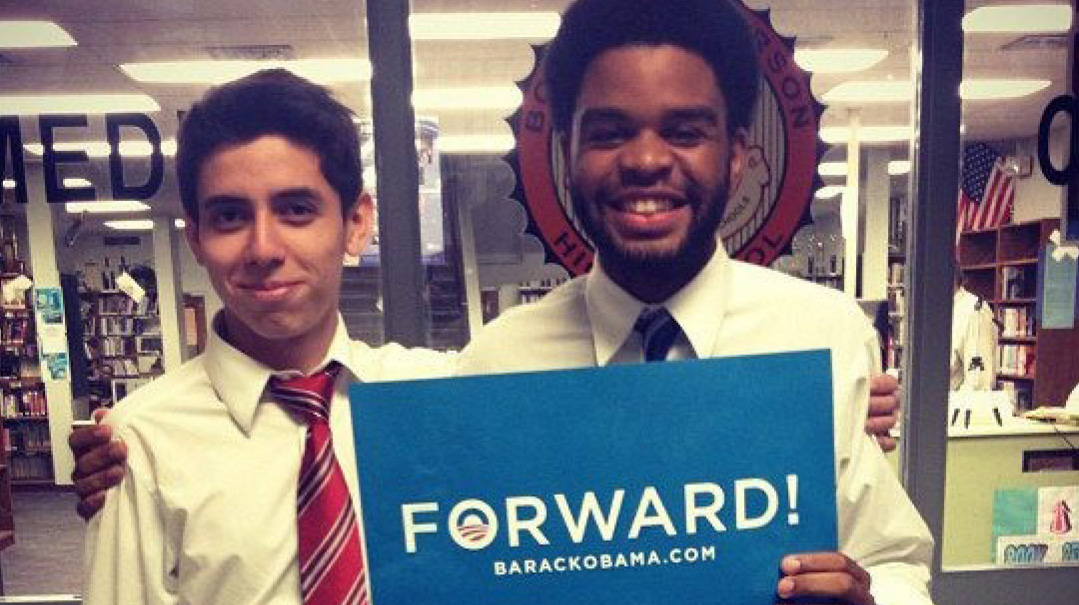
Before the 2012 presidential election, James and his classmate Jeremiah conducted a mock presidential debate for the whole school – James played Romney, Jeremiah played Obama. Now James is trying to recapture the original American art of respectful but spirited debate
Hard to Master
The new formats frankly look nothing like the debate competitions of my youth. But watching a few rounds of both formats at Incubate Debate’s website, I can say that they strike me as more fun, and far less cutthroat. (I used to return from every debate tournament with terrible leg cramps from tension, something that never happened to me in tennis tournaments.)
For one thing, there are far fewer tournaments. Florida is divided into six regions, and each hosts three tournaments a year. Second, the competitions are far less research-heavy. A month before a tournament, participants receive a research “packet” on both sides of the issue, and they are invited to a podcast in which experts across a spectrum discuss the issue.
Participants can still supplement with their own research, but it is much less likely to avail them. I used to go up to the podium with as many as 25 note cards with quotes from authorities. In Townhall, only a single handwritten note card is permitted, and in Roundtable none.
Fewer tournaments, but far more topics. Over the course of a season, Incubate Debate participants will address twelve topics, chosen from four subject areas: the Constitution and US government, foreign policy, economics, and current events. Topics are selected by a panel of experts whom Fishback has reached out to from places like Harvard’s Kennedy School of Government and leading think tanks. But they are designed to speak to the real lives of the participants, like one recent topic on the best response to the opioid crisis. Technical subjects, like a NSDA topic on the regulation of cryptocurrency, are avoided.
Debaters in my day rarely ventured far from the podium, upon which they rested their spreadsheets and from which they waved their note cards. The participants in Townhall move freely about the stage, almost entirely unburdened, while giving far shorter speeches than in former times.
Many debaters whom I competed against had deep, sonorous voices; some could speak at an incredible clip, apparently without the need to breathe; and the best were highly persuasive. But all remained firmly behind the podium, and few were yet polished orators or great wits, as is required in British parliamentary debate. Prior to delivering my high school graduation address, I had to seek help from a friend on the speech team for a few hand gestures I might use.
In describing the formats he has created, James keeps coming back to the same refrain: “Easy to learn; hard to master.” But the easy-to-learn part means that both formats could be easily be introduced as part of a debate-centered curriculum from elementary school through high school. Such curricula have shown great promise in improving student involvement and reasoning ability. (See this week’s Outlook.)
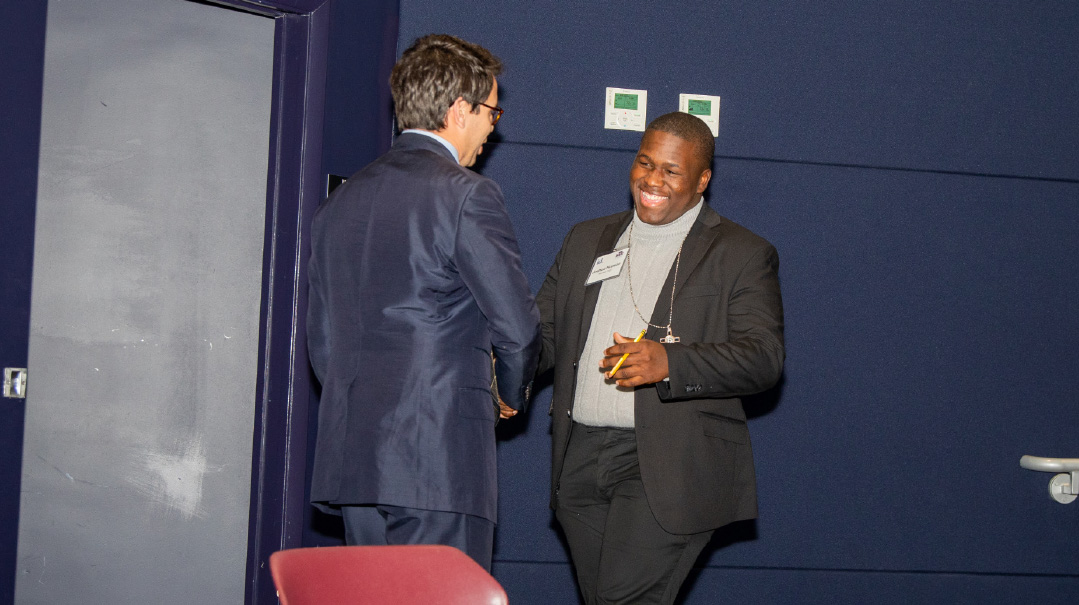
Prizewinning debater Joshua Hopson credits Incubate Debate for changing his entire community’s mindset: “It proved that we are more than just athletes, that we are truly intelligent young men and women who can change the world”
Equal Access
In addition to the completely new formats, James has done everything to ensure that Incubate Debate draws the widest possible group of participants. “When I debated in high school, I only faced teams from Florida’s five wealthiest counties,” James tells me. That was in part because of the financial costs involved in debating, particularly travel to national tournaments, and the spread-out nature of more rural counties.
The issue of equality of access is crucial to James, who comes from a working-class family: his father had a tree-trimming service and then worked as a bus driver for the county, and his mother is an immigrant from Colombia.
Incubate Debate covers the whole state, and the costs are largely self-financed by James, with help from several private donors and foundations. Joshua Hopson, a star football player from Pahokee (pop. 5,500), a dirt-poor, almost entirely minority town — at the opposite end of Palm Beach County, both geographically and economically, from Donald Trump’s Mar-a-Lago resort — is an example of the type of student whom James sought to draw to debate.
Hopson won Incubate Debate’s Dr. Martin Luther King Jr. Invitational in January, and he will be interning for the organization this coming year, prior to attending the University of Florida. He credits Incubate Debate with having supported him, as a family, “during a dark time in [his] life, after the passing of [his] grandmother.”
Incubate Debate, he says, “was an outlet to channel some of my passion into sound arguments to support my opinions. Incubate Debate also helped me to change the entire mindset of my community in Pahokee, by proving that we are more than just athletes, that we are truly intelligent young men and women… who can change the world. Incubate Debate gave me the opportunity to speak freely without being judged. It has changed my life.”
A firm believer in federalism, James is generously sharing the wealth of his experience. A slew of ex-debaters, current ones, and debate coaches have reached out to him to discuss how to introduce versions of Incubate Debate in their states. He freely shares what he has done, while open to other states creating variations on his models.
He even hopes to see Incubate Debate or offshoots thereof spread internationally. Already one tournament has been run in Ghana based on Incubate Debate models, using “kitchen table” topics appropriate to Ghana. One of the topics concerned Ghana’s proper response to China’s Belt and Road foreign policy, which is of great concern to the mineral-rich African country. Another raised the issue of the predominance of English in the country’s school system.
When I ask James if he has ever been to Israel, he replies that he plans to visit in the fall. He is well aware that competitive debate is very popular in Israeli universities, and arguing is something of a national sport. He intends to explore the possibilities of bringing some type of Incubate Debate format to Israel.
As he sees it, the skills and habits of mind developed by the Incubate Debate formats should be available to young people everywhere. “The debate I knew taught me to think and learn and care about issues that affected people different from me,” he says. “How much better for young people from all backgrounds to bridge the divides that tear us apart, and to discover what unites them?” —
Presidential Prescription
Because James has clearly thought as much about the structure of debate as anyone, I can’t resist asking him how he would structure both the presidential primary debates, with a large number of participants, and then the showdowns between the Democratic and Republican nominees.
I’m delighted when his first suggestion in both cases is to get rid of the moderators entirely, something I’ve long felt is crucial. The moderators are inevitably a hand on the scale of debates, viewing themselves as fact-checkers and often assuming the role of debaters themselves, even though they are not running for president.
For the nomination debates, James’s first prescription is that all the participants be seated, as in the Roundtable format, which leads to less aggressive behavior and fewer attempts to intimidate. “The best thoughts are born not in the tumult of motion, but in the stillness of seated conversation,” he comments.
James would grant each candidate ten minutes of time, which they could use any way they choose — an opening statement, questioning opponents, switching the discussion in another direction. But when their time clock is exhausted, they would be done.
For the presidential debates between the Democrat and Republican candidates, the key to remember is that Abraham Lincoln and Stephen Douglas did not have any moderators for their debates, and moderators are no more needed today. At most, the general subject area should be determined, but then the candidates should be left to face-off against one another without a referee in the ring, perhaps with time allotted for questioning one another.
(Originally featured in Mishpacha, Issue 968)
Oops! We could not locate your form.







